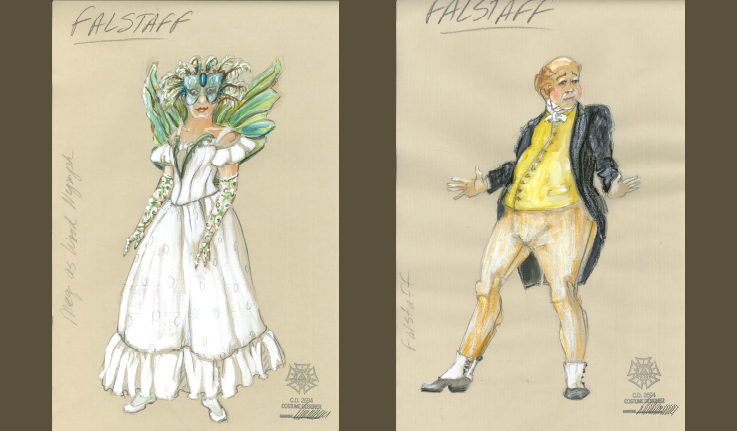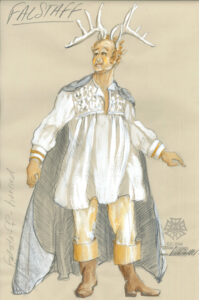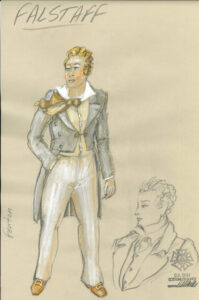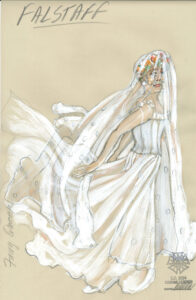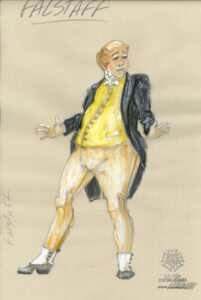
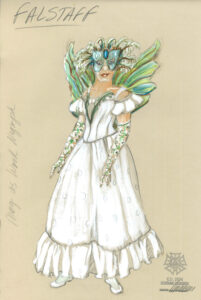 “Falstaff,” Verdi’s only comic opera, will open next Thursday, April 4, at UNCG Auditorium, and it’s not only the singing that will dazzle audiences. The production has offered an exciting design opportunity for Professor Deborah Bell and the campus costume design studio artisans and technologists.
“Falstaff,” Verdi’s only comic opera, will open next Thursday, April 4, at UNCG Auditorium, and it’s not only the singing that will dazzle audiences. The production has offered an exciting design opportunity for Professor Deborah Bell and the campus costume design studio artisans and technologists.
At this very moment, an array of fanciful and carefully tailored outfits is receiving final stitches: bubble-adorned gossamer wings for fairies, petticoats and corsets for glamorous bats, and rippling china silk head coverings for Victorian goblins are only the beginning.
In Verdi’s story, the women who the boastful Falstaff believes he is wooing plan a grand prank in the form of a masquerade, which is the opera’s final scene. Bell’s design concept explores the Victorian quality of restraint and the act of cutting loose.
“We’re illustrating a Victorian masquerade that meets New Orleans Mardi Gras,” she says.
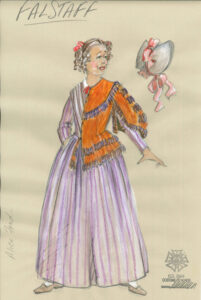 Bell has designed costumes for musicals, opera, and theater productions for more than three decades. Her off-campus designs have appeared at Triad Stage, Seaside Music Theatre, University of Alabama-Birmingham, TheatreFest, Western Stage, and Colorado Shakespeare Festival. She is the author of “Mask Makers and Their Craft: An Illustrated Worldwide Study” (McFarland, 2014, second edition), which explores the work of three dozen mask makers living on five continents, and she is also the editor of a collection of essays on global masquerade. Consequently, her exploration of masquerade elements for “Falstaff” holds special significance.
Bell has designed costumes for musicals, opera, and theater productions for more than three decades. Her off-campus designs have appeared at Triad Stage, Seaside Music Theatre, University of Alabama-Birmingham, TheatreFest, Western Stage, and Colorado Shakespeare Festival. She is the author of “Mask Makers and Their Craft: An Illustrated Worldwide Study” (McFarland, 2014, second edition), which explores the work of three dozen mask makers living on five continents, and she is also the editor of a collection of essays on global masquerade. Consequently, her exploration of masquerade elements for “Falstaff” holds special significance.
Bell began sewing when she was ten years old, making and selling Barbie clothes as she was learning, and she made her own clothes when she was in high school. But alongside her love of clothing was her love of theater.
“A costume by itself isn’t a work of art,” she says. “It’s only when the costume is on the performer – with the lights, the sound, the movement, the words and the music – that it has the potential to become an artistic expression. That’s when it transports you from one reality to another, more intense reality.”
She says she also loves theater because each play teaches her something new about the world.
“Sometimes it’s history, sometimes it’s social challenges of the day, and sometimes it’s figuring out interesting visual ways to create an interesting stage picture. Sometimes it’s learning what a dancer needs to have full use of their body without a costume hindering them. And the fabrics and craft materials are always evolving.”
At UNCG Bell has taught a writing-intensive costume design class and says that the process of writing and costume design can be the same, in terms of careful editing.
“The best work isn’t overstuffed,” she says. “It’s so easy to add one more sequin, one more feather but, good design is all about telling that story in an elegant and concise enough way so that the audience maintains focus. Good writing and good design both require economy.”
Students who come through the design and production side of the UNCG School of Theatre are introduced to a range of areas related to costume production, such as millinery, pattern drafting, costume crafts, studio and wardrobe management, stage makeup and wig creation. Bell says her students are essential to the success of campus productions. They master many skills throughout their time working on UNCG productions, but beyond the sketching, cutting, sewing, shaping, dyeing, and styling, they learn about the distinct challenges of working collaboratively in the theater. For “Falstaff” graduate student Jonathan Wentz is serving as assistant costume designer and undergraduate Brandon Jarmasek is helping to create masks. Costume design studio manager Amy Holroyd and supervisor of costume crafts Emily Helig are also guiding students in the work for “Falstaff.”
As Bell says, it takes an army, and everything is dependent on everything else – the stage, the actors, the time, the budget, and more.
“The final performance on stage makes the design come alive,” she says. “The ultimate challenge resides in discovering the most you can do with the design parameters that are given to you.”
For more information about “Falstaff” visit the UNCG Opera Theatre website. Performances are at 7:30 p.m. April 4 and 5 and at 2 p.m. April 7. Tickets are available from the UNCG Box Office: (336. 334.4392, 1 to 5 p.m. Monday-Friday), from Triad Stage online, by phone (336. 272.0160, 1 to 6 p.m. Monday-Friday and 2 to 6 p.m. Saturday) and at the door one hour before the performances at UNCG Auditorium.
By Susan Kirby-Smith
Drawings by Deborah Bell
